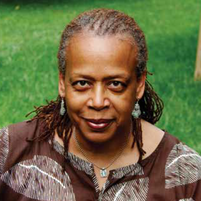Mary Jackson Scroggins: Seventeen-year Ovarian Cancer Survivor and Advocate

I am a 17-year ovarian cancer survivor. The knowledge that my survival depended so heavily on chance and good luck fueled my desire to spread awareness about gynecologic cancers, cancer health disparities, and the need for more research funding.
I was 46 years old when I was diagnosed with stage 1a ovarian cancer. For about two years, I had experienced symptoms that could have suggested ovarian cancer – abdominal bloating, weight gain, frequent urination, and excessive menstrual bleeding. I know my body and knew something wasn’t right, so I changed gynecologists during this period to find answers and get relief, but none of us ever suspected cancer.
To remove fibroid tumors and an ovarian cyst, I had a hysterectomy in September 1996. During the surgery, my gynecologist discovered the tumorous ovary and contacted a gynecologic oncologist to complete the surgery. In so doing, she probably saved my life and surely increased my chances of recurrence-free survival.
When my gynecologic oncologist called with the pathology report, he told me he had good and bad news. The good news was that I had stage 1a ovarian cancer, which is the earliest and most treatable stage. The bad news was that it was clear-cell, the most aggressive and least well understood ovarian cancer type.
Although my cancer was early-stage, primarily because it was clear-cell, I received six cycles of chemotherapy – paclitaxel (Taxol) and cisplatin (Platinol). The side effects from the chemotherapy were typical – slight nausea and fatigue for a few days after each cycle and hair, taste, and appetite loss – but overall, except for one bad reaction to anti-nausea medication, my treatment was pretty uneventful.
I finished chemotherapy in February 1997 and have not had a recurrence of the disease. For this I am truly thankful. And although I am still very careful about my health care, the frequency of my follow-up CT scans has decreased.
My oncology nurse, Alice Beers, was vital to my early recovery. She was also instrumental in connecting me with other women who had gynecologic cancers, and I joined the Ovarian Cancer National Alliance, which along with my family became a lifeline. The connection to survivors who understood the disease and who were active in helping others – even as they waged their own battles – was empowering.
Although I had always been active in my community, these connections sparked my advocacy efforts in the cancer community. And since I passionately believe that no one’s survival and well-being should be driven by ZIP code, race or ethnicity, or socioeconomic status, one of the initiatives closest to my heart is the elimination of cancer health disparities. There is no acceptable level of the unnecessary and selective suffering and death experienced by medically underserved populations.
A powerful mechanism for reducing and ultimately eliminating cancer and other health disparities is research. As a matter of good science and of good conscience, that research must be anchored with clinical trials that include participants from all segments of the population.
We are all touched by cancer, and we must have the will as a nation to ensure that every citizen will receive the level, length, and depth of care that is appropriate for her or his condition. To do so, we must act on what we already know and on what we learn through research.
One of the reasons that I advocate for others and share my experience is to spread awareness that ovarian cancer can strike any woman, at any age, of any race, and that it is neither silent nor necessarily a death sentence.
The AACR was saddened to learn that Mary “Dicey” Scroggins passed away on August 1, 2022. We are deeply grateful to Dicey for sharing her experiences with cancer in the AACR Cancer Progress Report 2013 and for her ongoing work to support patients and caregivers and to advocate for increased funding for cancer research, including as a member of the AACR. We offer our heartfelt condolences to her family and friends.